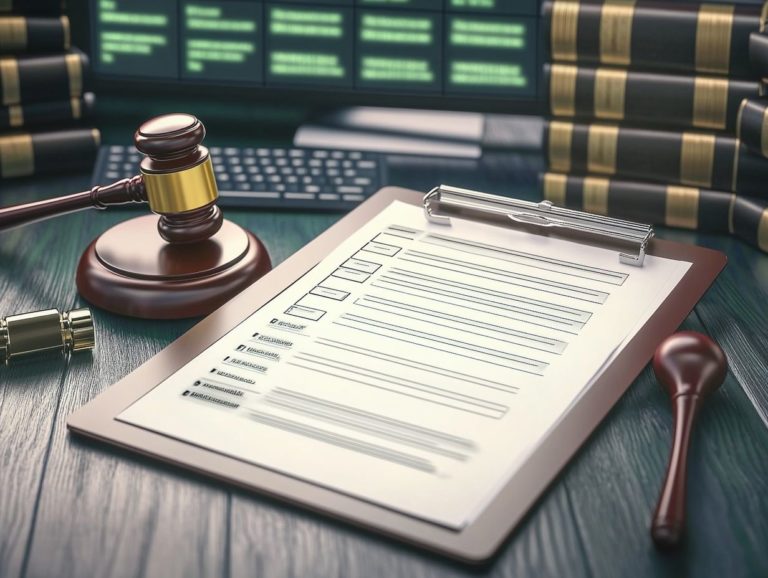5 Common Misconceptions About IP Litigation
Intellectual property (IP) refers to the creations of the mind, like inventions, designs, and brands. IP litigation is often shrouded in misconceptions that can lead you astray regarding its true nature and implications.
You might think it’s a realm exclusively for large corporations, centered solely on patents, or that it s always a lengthy and expensive endeavor. Perhaps you believe that only lawyers can successfully navigate this complex landscape, or that winning a case guarantees financial prosperity.
This article will clear up these myths and explain what IP litigation truly means. You will gain valuable insights to safeguard your intellectual assets effectively.
Prepare to delve into the realities of IP litigation and empower yourself with the knowledge necessary to protect your business.
Contents
- Key Takeaways:
- 1. IP Litigation Is Only for Large Corporations
- 2. IP Litigation Is Only for Patent Disputes
- 3. IP Litigation Is a Lengthy and Expensive Process
- 4. Only Lawyers Can Handle IP Litigation
- 5. Winning a Lawsuit Means Automatic Financial Gain
- What Is IP Litigation and When Is It Necessary?
- Frequently Asked Questions
- What is IP litigation?
- What are some common misconceptions about IP litigation?
- Is it true that IP litigation is only for big companies with large budgets?
- Is IP litigation always expensive and time-consuming?
- Do I need to engage in IP litigation for every case involving intellectual property?
- Is IP litigation only about securing financial compensation?
- Is IP litigation the only way to protect my intellectual property?
Key Takeaways:
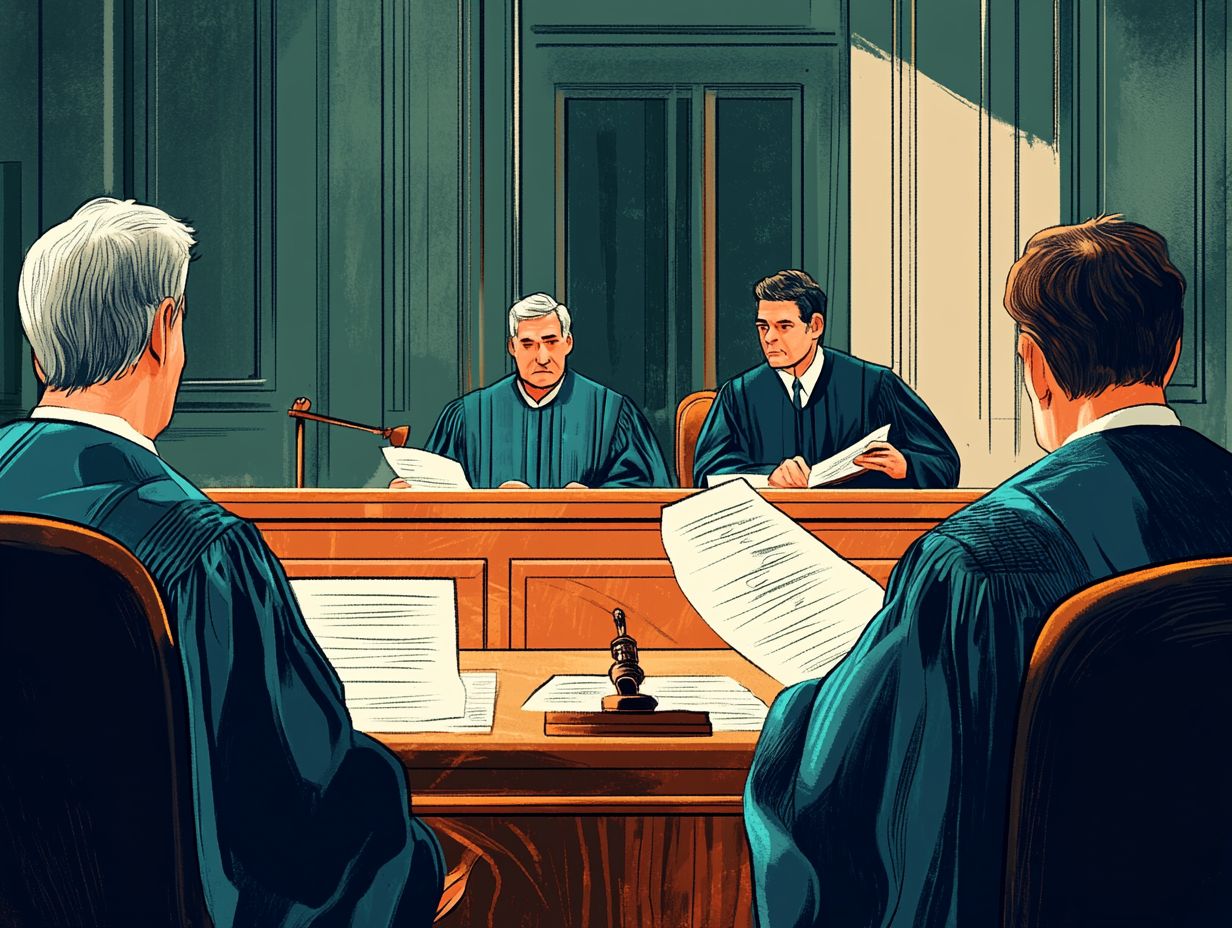
IP litigation is not just for large corporations; it’s also for small businesses and individuals.
It goes beyond patent disputes and can involve other forms of intellectual property such as trademarks and copyrights.
IP litigation is complex and costly, requiring skilled lawyers and potentially taking years to resolve.
1. IP Litigation Is Only for Large Corporations
Contrary to popular belief, IP litigation isn’t just the playground of large corporations. Small businesses and non-profit organizations are increasingly finding themselves in the thick of legal disputes over intellectual property rights. To navigate these challenges effectively, it’s crucial to be aware of the top 10 common IP litigation mistakes to avoid, including those related to patents, trademarks, and copyrights.
This myth often leads smaller entities to neglect crucial protection strategies for their creative assets and innovative ideas. This oversight can have serious consequences; even modest-sized enterprises face challenges that could jeopardize their market position.
Consider a small tech startup facing a competitor’s patent infringement. Its innovative algorithm is at risk, showing that innovation can be vulnerable, regardless of size.
Think of the local bakery that successfully defended its trademark against a major chain. This case underscores the critical importance of understanding and protecting one s IP rights.
Small businesses must acknowledge that safeguarding their innovations is not just about being creative; it involves deftly navigating the complex legal landscape of IP law to ensure their ideas receive the protection they deserve.
2. IP Litigation Is Only for Patent Disputes
Many individuals think that IP litigation is all about patent disputes, but the truth is much broader. It includes trademarks, copyrights, and trade secrets, all of which require diligent enforcement to safeguard ownership rights. To understand more, explore the key differences between IP litigation and other litigation.
Trademark infringement occurs when a brand s unique symbol, logo, or name is used without permission, leading to consumer confusion. Take the well-known case involving Nike, for instance. The clothing giant successfully litigated against a smaller company that dared to use a similar swoosh logo, preserving its brand identity.
Copyright violations concern the unauthorized use of creative works, such as music, literature, or software. A prime example is the infamous Napster case, which brought to light the repercussions of software allowing illegal downloads of copyrighted music.
Both types of infringement not only undermine the original creators but also spawn intricate legal battles over intellectual property rights.
3. IP Litigation Is a Lengthy and Expensive Process
Many view IP litigation as a long and expensive road, but understanding the differences between IP litigation and other lawsuits can reveal options for quick dispute resolution and proactive measures to reduce risks.
As you navigate the various stages of IP litigation initial assessments, pleadings, discovery, and potentially a trial each step incurs its own costs. This can create a significant financial burden.
Many parties discover that alternatives like mediation or settlement negotiations offer more cost-effective solutions while preserving valuable relationships.
Engaging effective legal counsel is essential in this process. Experienced attorneys can guide you through the intricate legal landscape, pinpoint key issues early, and streamline the litigation journey to avoid unnecessary delays and expenses.
This approach not only facilitates a more efficient resolution of disputes but also fortifies your intellectual property for the future.
4. Only Lawyers Can Handle IP Litigation
While legal expertise is undeniably important in IP litigation, the idea that only lawyers can navigate the process is misleading. You can take proactive steps by familiarizing yourself with your ownership agreements and talking to rights holders. Additionally, understanding the 5 must-know terms in IP litigation can help you avoid potential disputes.
By educating yourself about your intellectual assets, you ll gain a clearer understanding of the value embedded in your innovations and creations. This awareness equips you to implement pre-litigation strategies that mitigate risks and uncover opportunities for collaboration and growth.
Non-legal professionals, like business development teams or product managers, play a crucial role in negotiating licensing agreements. Their insights into market trends and customer needs are incredibly valuable.
Grasping IP rights requires a holistic approach where cross-functional teams work together to manage all aspects of intellectual property effectively. This fosters an environment where innovation thrives while minimizing the risk of legal conflicts.
5. Winning a Lawsuit Means Automatic Financial Gain
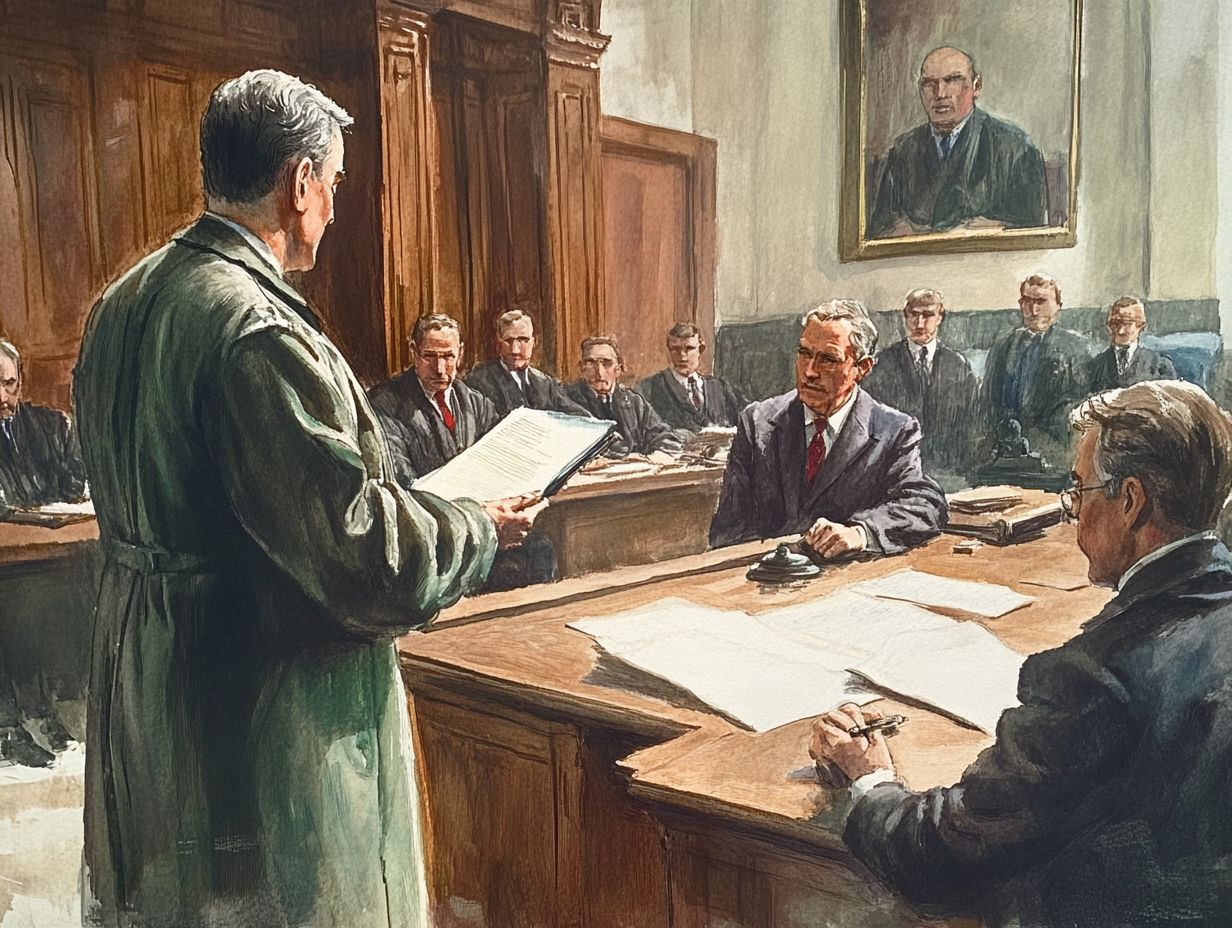
A common misconception in IP litigation is that winning a lawsuit automatically guarantees financial gain. However, as outlined in the article on the 5 major challenges in IP litigation today, litigation outcomes can vary significantly, and a victory does not always equate to immediate economic value or profit.
You might find yourself in a challenging position even after securing a favorable ruling due to high litigation costs, potential appeals, and the lengthy process of collecting any awarded damages. Settlements often provide a more pragmatic solution, allowing you to avoid the uncertainties of a trial while still obtaining some form of compensation.
Consider high-profile cases like the Apple versus Samsung dispute. Despite winning multiple claims, the overall financial impact fell short of expectations due to extensive legal fees and prolonged negotiations. The long-term repercussions on market dynamics can be unpredictable, as companies may struggle to adapt or recover from reputational harm, even when they seemingly emerge victorious in court.
What Is IP Litigation and When Is It Necessary?
IP litigation is when you take legal action to protect your ideas and creations against infringement think patents, trademarks, and copyrights. It usually becomes necessary when all other protective measures fail to stop unauthorized use of your innovations and creative works.
This area of law covers various types of intellectual property, each serving distinct purposes and needing tailored approaches when disputes arise. For example, patent litigation often surfaces when a competitor copies your unique product or method. Trademark disputes might arise from brand dilution or confusion in the marketplace. Copyright infringement generally pertains to the unauthorized use of artistic works such as music, literature, or software.
You could find yourself in legal hot water in several scenarios, including:
- A company stealing your proprietary technology.
- An artist s work being reproduced without consent.
- A brand battling counterfeit goods.
Understanding IP rights is essential, not only for their protection but also for nurturing innovation and ensuring fair competition in a constantly evolving economy. Stay informed to protect your innovations!
What Types of Intellectual Property Can Be Litigated?
Intellectual property (IP) includes several forms that can end up in court, such as patents, trademarks, copyrights, and trade secrets. Understanding these types is essential for creators, innovators, and businesses.
Patents protect inventions and processes for a limited time. To qualify, an invention must be new, useful, and non-obvious.
Trademarks safeguard symbols, names, and slogans that distinguish goods and services. They are crucial assets for building a brand identity.
Copyrights protect original works like literature and art. They highlight the value of creativity.
Trade secrets are closely held information that gives businesses a competitive edge. They are usually protected by confidentiality agreements.
Cases like Apple Inc. v. Samsung Electronics Co. show the complexities of these protections. Understanding this landscape is crucial for navigating challenges and seizing opportunities.
What Are the Key Steps in an IP Litigation Process?
The IP litigation process unfolds through several critical steps from the initial complaint and discovery to trial and possibly an appeal. Each step is laden with intricacies that demand a nuanced understanding of intellectual property law.
Navigating these stages requires careful legal counsel and strategic case preparation. This ensures your arguments are compelling and your evidence is persuasive.
First, you will need to file a complaint that clearly outlines your claims. After this, both parties enter the discovery phase, exchanging relevant information and evidence. Expert insights are often needed to pinpoint crucial documents and witnesses.
As the case advances, having adept legal representation becomes essential. Your lawyer will draft motions, prepare for depositions, and develop a comprehensive trial strategy.
Ultimately, these efforts may culminate in a trial. Your effectiveness in presentation and negotiation will be crucial. If the outcome is not in your favor, the possibility of an appeal offers an additional path for legal recourse.
How Can a Business Protect Itself from Potential IP Litigation?
You can take several proactive steps to shield your business from potential IP litigation. Start by establishing comprehensive licensing agreements, conducting regular audits of your intellectual assets, and implementing robust measures to mitigate infringement risks.
Consider registering trademarks and copyrights. This clarifies ownership and gives you the legal backing to enforce your rights in case of infringement.
Implementing trade secret policies helps keep your sensitive information safe from unauthorized use. Seeking legal advice from IP experts can provide you with valuable insights and tailored strategies for navigating ownership rights.
Ultimately, understanding and effectively enforcing these rights helps you maintain a competitive edge. It also cultivates an environment ripe for innovation.
What Are the Different Outcomes of an IP Litigation?
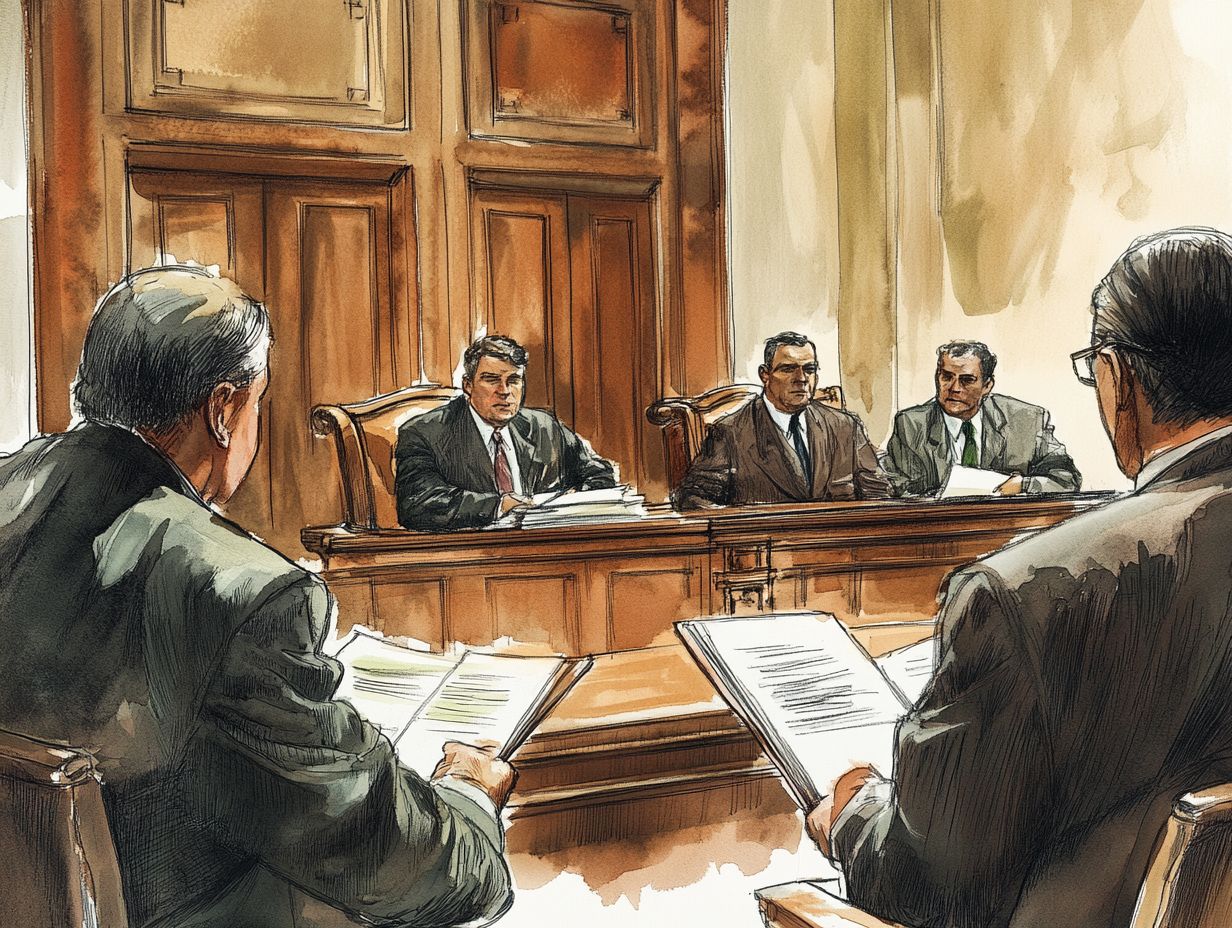
The outcomes of IP litigation can vary widely. They can include financial compensation, court orders to stop violations, or even a review of existing contracts.
Financial compensation offers a quick fix for damages. However, it might not address the long-term disruptions to your business.
Court orders can prevent further violations, protecting your market share and brand reputation. Yet, they may force the infringer to change their practices, introducing new challenges.
Reviewing contracts could create new revenue streams or potential liabilities. This can fundamentally change future partnerships and your business strategy.
To navigate these outcomes, you need to understand not just legal precedents but also market dynamics.
What Are the Common Mistakes Businesses Make in IP Litigation?
Businesses often fall into common traps during IP litigation, including poor legal advice and misconceptions. For example, there are myths about IP strategy that can lead to misunderstandings about ownership agreements.
Such mistakes can lead to costly, prolonged legal battles that distract from your core operations. A key error is not doing thorough research before litigation, which can lead to underestimating the opposing party.
Not keeping good records can also harm your case. Seeking professional help early is essential for clearly defined agreements.
Regularly reviewing your IP portfolio and keeping an eye on competitors can strengthen your defense. This boosts your business’s resilience against infringements.
Frequently Asked Questions
What is IP litigation?
IP litigation is the legal process for resolving disputes over intellectual property rights. This includes issues like patents, trademarks, copyrights, and trade secrets.
What are some common misconceptions about IP litigation?
1. IP litigation is only for large companies. 2. IP litigation is always expensive and time-consuming. 3. IP litigation is only for high-profile cases. 4. IP litigation only seeks financial compensation. 5. IP litigation is the only way to protect your intellectual property, but there are many factors to consider, as outlined in the article on common misconceptions about international IP law.
Is it true that IP litigation is only for big companies with large budgets?
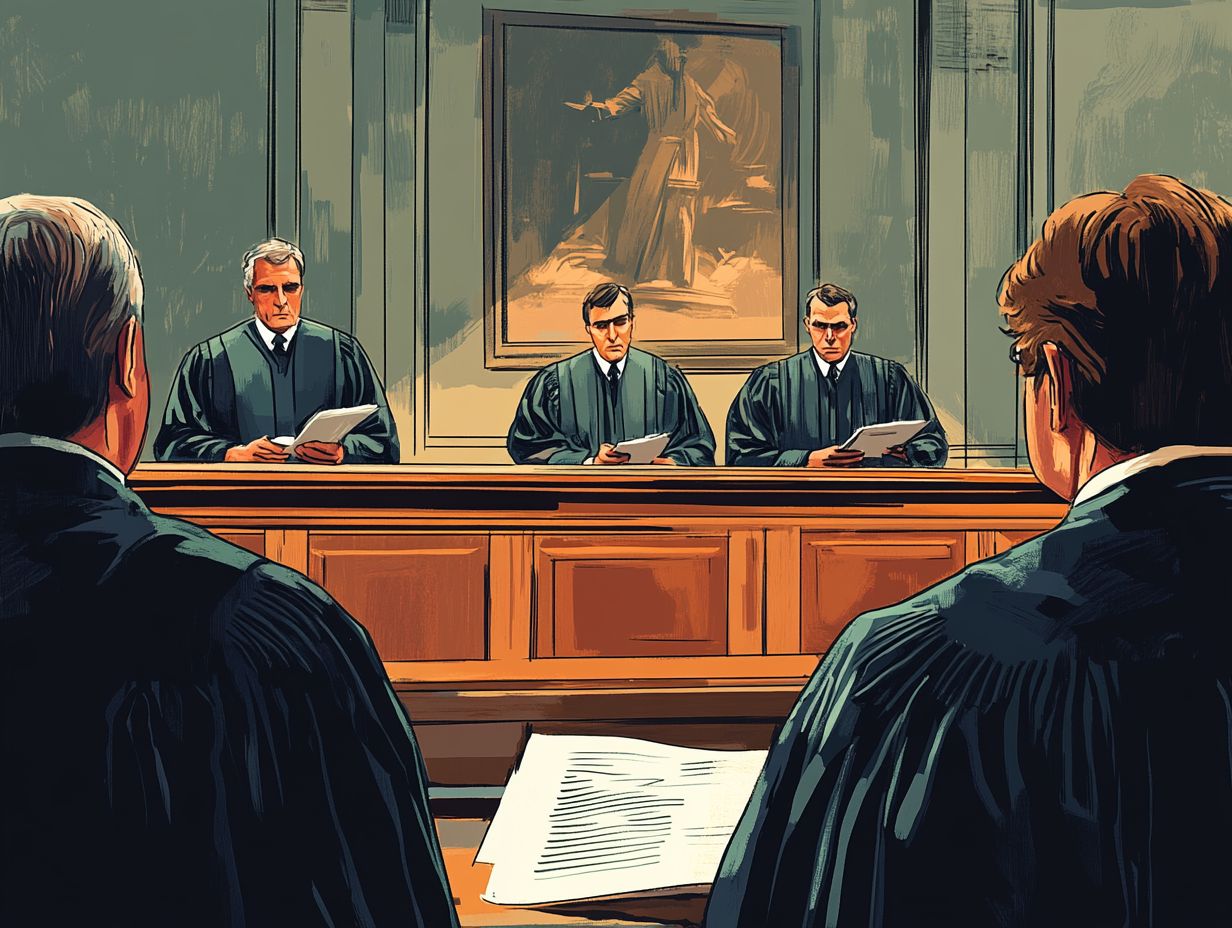
No, IP litigation is not limited to large corporations. Individuals and small businesses can also protect their rights through litigation.
Is IP litigation always expensive and time-consuming?
Not always. While some cases can be costly and lengthy, alternatives like mediation can save time and money.
Do I need to engage in IP litigation for every case involving intellectual property?
No, IP litigation is not always necessary. Mediation and licensing agreements can be more efficient and cost-effective options.
Is IP litigation only about securing financial compensation?
While financial compensation may be a part, it is not the only goal. IP litigation also helps protect your rights from unauthorized use of your ideas.
Is IP litigation the only way to protect my intellectual property?
No, there are other ways to protect your intellectual property, such as registering patents, trademarks, or copyrights. It’s important to talk to an experienced IP attorney to find the best strategy for your situation.






